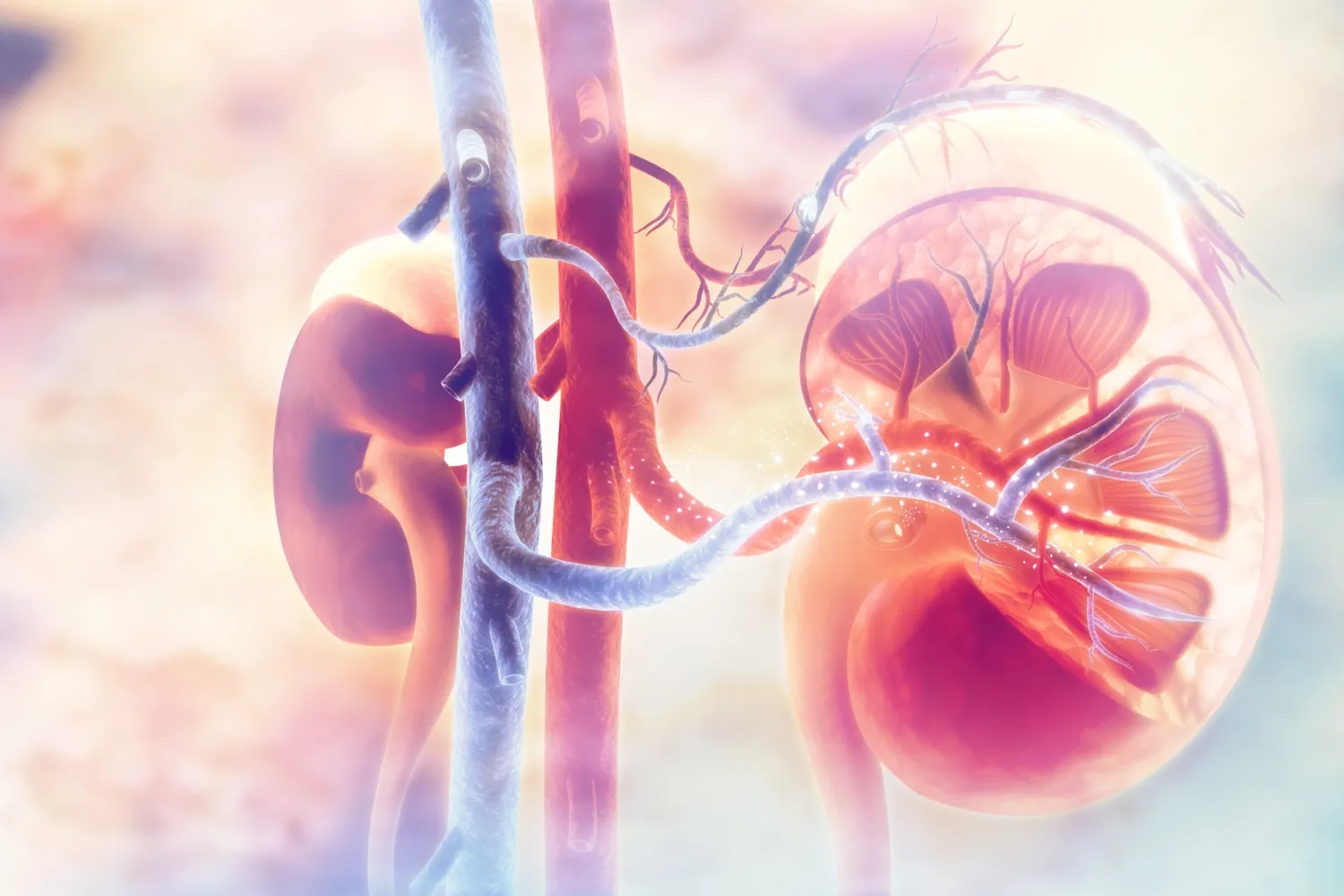
Spotlight on dementia and Alzheimer's disease
In recent years, new knowledge has improved the care of people with dementia. The progress is based on an interdisciplinary collaboration between different research areas and professional groups in healthcare. However, the care of dementia patients is extremely resource-intensive, and more research is needed to find better ways to help patients and their loved ones.
Possible causes
 Photo: shutterstock
Photo: shutterstockIncreased risk of dementia after acute kidney injury
Acute kidney injury is associated with an increased risk of developing dementia, according to a new study published in the journal Neurology by researchers at Karolinska Institutet and others.
 Photo: Getty Images
Photo: Getty ImagesPossible link between chronic stress and Alzheimer’s disease
Researchers at KI have investigated the possible associations between chronic stress, mild cognitive impairment and Alzheimer’s disease. The study shows that people aged 18–65 with a previous diagnosis of chronic stress and depression were more likely than other people to be diagnosed with mild cognitive impairment or Alzheimer’s disease.
 Photo: Getty Images,Getty Images/iStockphoto
Photo: Getty Images,Getty Images/iStockphotoHigher risk of dementia in Swedish top-division football players
Men who played football (soccer) in the Swedish top division until the mid 1900s had a higher risk of dementia than men from the general population, a new study from Karolinska Institutet published in The Lancet Public Health reports.
 Photo: Pixabay
Photo: PixabayLink between rheumatoid arthritis and cognitive decline in dementia
A new Swedish study has, for the first time, shown a link between rheumatoid arthritis (RA) and cognitive decline in dementia patients. The study, published in the scientific journal Neurology, emphasizes the importance of careful monitoring and management to prevent cognitive decline.
 Photo: iStock
Photo: iStockAir pollution linked to dementia
People continuously exposed to air pollution are at increased risk of dementia, especially if they also suffer from cardiovascular diseases, according to a study in JAMA Neurology. Heart patients who live in polluted environments may require additional care to prevent dementia.
 Photo: Getty Images
Photo: Getty ImagesNew study shows how dementia affects the brain's ability to empathise
Patients with frontotemporal dementia often lack the ability to empathize. A study at Karolinska Institutet has now shown that these patients do not show the same brain activity as healthy individuals when they witness the pain of others, a finding that it is hoped will increase understanding of this specific dementia disease.
Diagnosis and treatment
 Photo: Getty Images,Getty Images/iStockphoto
Photo: Getty Images,Getty Images/iStockphotoHigh metabolism is an early sign of Alzheimer’s disease
An early phase in the process of developing Alzheimer’s disease is a metabolic increase in a part of the brain called the hippocampus, report researchers from Karolinska Institutet in a study published in Molecular Psychiatry. The discovery opens up for new potential methods of early intervention.
 Photo: Getty Images
Photo: Getty ImagesAlzheimer’s drug may slow down cognitive decline in dementia with Lewy bodies
Dementia with Lewy bodies is a type of dementia that is similar to both Alzheimer’s disease and Parkinson’s disease but studies on long-term treatments are lacking. A new study from Karolinska Institutet highlights the potential cognitive benefits of cholinesterase inhibitor treatment.
 Photo: Pixabay
Photo: PixabayCommon Alzheimer’s treatment linked to slower cognitive decline
Research from Karolinska Institutet shows persisting cognitive benefits and reduced mortality for up to five years after diagnosis of Alzheimer's disease in patients treated with cholinesterase inhibitors.
 Photo: Getty IMages,Getty Images
Photo: Getty IMages,Getty ImagesProtein in urine can predict risk of dementia
A study shows that people with higher levels of the protein albumin in their urine are at increased risk of developing dementia. The study, led by researchers at Karolinska Institutet, is published in the scientific journal Journal of Internal Medicine.
 Photo: Getty Images
Photo: Getty ImagesBlood-based markers may reveal AD ten years before symptoms
Alzheimer disease begins decades before any symptoms, such as memory loss, start to show. Consequently, early diagnosis increases the chances of slowing the disease down with drugs. A new study on an inherited form of the disease shows that a protein called GFAP is a possible biomarker for very early stages of the disease.
 Photo: iStock
Photo: iStockSimple tool shows life expectancy after dementia diagnosis
Researchers have developed a simple tool that shows the survival probability of a person with dementia disease over three years. This, they hope, help doctors and others plan the necessary care.
 Photo: Foto: Getty Images.
Photo: Foto: Getty Images.Genetic differences important for Alzheimer's diagnosis
The two used methods for detecting amyloid pathology in Alzheimer's disease give ambiguous results. KI researchers have found genetic explanations for the differences that may be important for individual diagnostics and the development of future drugs.
 Photo: Getty Images
Photo: Getty ImagesTarget protein for diabetes drug linked to reduced risk of AD
Mechanisms associated with a particular diabetes drug can also help to protect against Alzheimer’s disease, a study by researchers at Karolinska Institutet reports. The results indicate that the drug’s target protein can be an interesting candidate for the treatment of Alzheimer’s disease.
 Photo: Ulf Sirborn
Photo: Ulf SirbornBrain imaging can predict Alzheimer’s related memory-loss
In a study published in the journal Molecular Psychiatry, Professor Agneta K. Nordberg and colleagues have imaged tau protein in the brains of living patients with Alzheimer’s disease. The amount and spread of tau proved a predictor of future memory loss.
More reading
 Photo: Illustration: Amanda Berglund
Photo: Illustration: Amanda BerglundThe fragile memory
Do you and your brother have different recollections of which one of you knocked over the Christmas tree when the cat ran away and the Christmas porridge got burnt? Perhaps you are both wrong. This according to researchers who study how we remember our lives.
 Photo: Martin Stenmark
Photo: Martin StenmarkStanding up for the elderly
You are the same person inside, although your body is ageing and your memory failing. Professor Maria Eriksdotter hopes to add to our knowledge of Alzheimer’s disease. But she also wants to fight ageism. “The status of the elderly needs to be raised,” she says.
 Photo: Ulf Sirborn
Photo: Ulf SirbornSurprising new theory about what might cause AD
KI professor Samir El Andaloussi and his colleagues have studied whether it is the amount of plaques in the brain or the amount of amyloid-beta 42 remaining that is more important for Alzheimer’s disease progression. Do as 800 000 people around the world, read the researcher's lay article about the findings on the news site The Conversation.
A shortcut to dementia research at KI
Center for Alzheimer Research
The Center for Alzheimer Research is a hub for all research with relevance for Alzheimer's disease and other dementias at Karolinska Institutet. The main goal of our research is to understand the mechanisms behind Alzheimer's disease and other dementias, to be able to prevent, diagnose and treat these disorders. Research at the Center for Alzheimer research
Aging Research Center (ARC)
A multidisciplinary research center, established in 2000 by Stockholm University and Karolinska Institutet, with the mission to improve the health and well-being of older individuals by contributing to the understanding of the aging process from a biomedical, psychological and sociological perspective in relation to life-long social and physical contexts. ARC conducts research and education and spreads research findings within and outside the scientific community.
Research groups in geriatrics and gerontology
Find research groups and units in the areas of geriatrics and gerontology at Karolinska Institutet. The list is compiled automatically from our research information database and is based on the Swedish standard classification of research subjects (SCB terminology).
